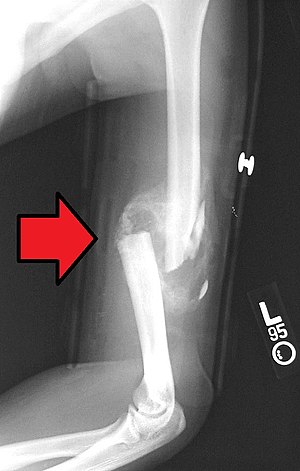Note: This is a project under development. The articles on this wiki are just being initiated and broadly incomplete. You can Help creating new pages.
Difference between revisions of "Bone healing"
(Created page with "thumb|right|''Bone healing of a fracture by forming a callus as shown by X-ray.'' '''Bone healing''', or fracture he...") |
Chaithrika (talk | contribs) (+adding internal link) |
||
| Line 1: | Line 1: | ||
[[File:Communitive midshaft humeral fracture callus.jpg|thumb|right|''Bone healing of a fracture by forming a callus as shown by X-ray.'']] | [[File:Communitive midshaft humeral fracture callus.jpg|thumb|right|''Bone healing of a fracture by forming a callus as shown by X-ray.'']] | ||
| − | '''Bone healing''', or fracture healing, is a proliferative | + | '''Bone healing''', or fracture healing, is a proliferative [[Physiology]]cal process in which the body facilitates the repair of a bone fracture. |
Generally bone fracture treatment consists of a doctor reducing (pushing) displaced bones back into place via relocation with or without anaesthetic, stabilizing their position to aid union, and then waiting for the bone's natural healing process to occur. | Generally bone fracture treatment consists of a doctor reducing (pushing) displaced bones back into place via relocation with or without anaesthetic, stabilizing their position to aid union, and then waiting for the bone's natural healing process to occur. | ||
| Line 7: | Line 7: | ||
Adequate nutrient intake has been found to significantly affect the integrity of the fracture repair. Age, Bone type, drug therapy and pre existing bone pathology are factors which affect healing. The role of bone healing is to produce new bone without a scar as seen in other tissues which would be a structural weakness or deformity. | Adequate nutrient intake has been found to significantly affect the integrity of the fracture repair. Age, Bone type, drug therapy and pre existing bone pathology are factors which affect healing. The role of bone healing is to produce new bone without a scar as seen in other tissues which would be a structural weakness or deformity. | ||
| − | The process of the entire regeneration of the bone can depend on the angle of dislocation or fracture. While the bone formation usually spans the entire duration of the healing process, in some instances, bone marrow within the fracture has healed two or fewer weeks before the final remodeling phase. | + | The process of the entire regeneration of the bone can depend on the angle of dislocation or fracture. While the bone formation usually spans the entire duration of the healing process, in some instances, bone marrow within the fracture has healed two or fewer weeks before the final remodeling phase. |
While immobilization and surgery may facilitate healing, a fracture ultimately heals through physiological processes. The healing process is mainly determined by the periosteum (the connective tissue membrane covering the bone). The periosteum is one source of precursor cells which develop into chondroblasts and osteoblasts that are essential to the healing of bone. The bone marrow (when present), endosteum, small blood vessels, and fibroblasts are other sources of precursor cells. | While immobilization and surgery may facilitate healing, a fracture ultimately heals through physiological processes. The healing process is mainly determined by the periosteum (the connective tissue membrane covering the bone). The periosteum is one source of precursor cells which develop into chondroblasts and osteoblasts that are essential to the healing of bone. The bone marrow (when present), endosteum, small blood vessels, and fibroblasts are other sources of precursor cells. | ||
[[Category:Physiology]] | [[Category:Physiology]] | ||
Latest revision as of 16:40, 16 June 2017
Bone healing, or fracture healing, is a proliferative Physiologycal process in which the body facilitates the repair of a bone fracture.
Generally bone fracture treatment consists of a doctor reducing (pushing) displaced bones back into place via relocation with or without anaesthetic, stabilizing their position to aid union, and then waiting for the bone's natural healing process to occur.
Adequate nutrient intake has been found to significantly affect the integrity of the fracture repair. Age, Bone type, drug therapy and pre existing bone pathology are factors which affect healing. The role of bone healing is to produce new bone without a scar as seen in other tissues which would be a structural weakness or deformity.
The process of the entire regeneration of the bone can depend on the angle of dislocation or fracture. While the bone formation usually spans the entire duration of the healing process, in some instances, bone marrow within the fracture has healed two or fewer weeks before the final remodeling phase.
While immobilization and surgery may facilitate healing, a fracture ultimately heals through physiological processes. The healing process is mainly determined by the periosteum (the connective tissue membrane covering the bone). The periosteum is one source of precursor cells which develop into chondroblasts and osteoblasts that are essential to the healing of bone. The bone marrow (when present), endosteum, small blood vessels, and fibroblasts are other sources of precursor cells.
